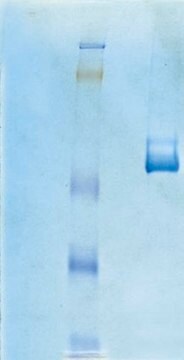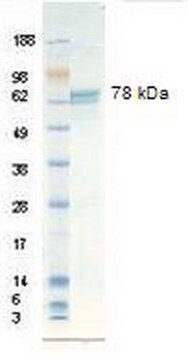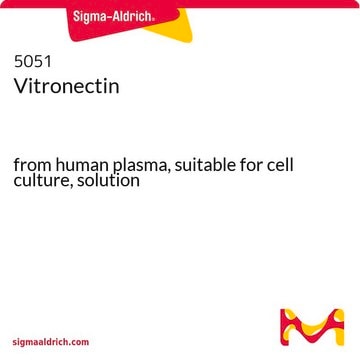CC130
Human Vitronectin
recombinant, expressed in E. coli, liquid, 0.5 mg/mL, used as an effective xeno-free alternative to matrigel, suitable for human ES and iPS cell culture, PLURISTEM®
Sinónimos:
S-protein, Serum-spreading factor, V75
About This Item
Productos recomendados
product name
PluriSTEM-XF® Recombinant Vitronectin, Human pluripotent stem cell culture.
biological source
Escherichia coli
human
Quality Level
assay
≥92% (SDS-PAGE)
form
liquid
manufacturer/tradename
PluriSTEM®
concentration
0.5 mg/mL
technique(s)
cell attachment: suitable
cell culture | mammalian: suitable
cell culture | stem cell: suitable
input
sample type: human embryonic stem cell(s)
UniProt accession no.
shipped in
dry ice
General description
PluriSTEM Recombinant Vitronectin is a truncated form of human vitronectin (gene 20-398 aa fragment) that was constructed with codon optimization, expressed in E. coli and purified as inclusing bodies. The final product was refolded using a unique “temperature shift inclusion body refolding” technology and chromatographically purified. The final product is considered xeno-free.
Application
Stem Cell Research
Cell Structure
ECM & Adhesion
Quality
Physical form
Storage and Stability
Legal Information
Storage Class
10 - Combustible liquids
wgk_germany
WGK 2
flash_point_f
Not applicable
flash_point_c
Not applicable
Certificados de análisis (COA)
Busque Certificados de análisis (COA) introduciendo el número de lote del producto. Los números de lote se encuentran en la etiqueta del producto después de las palabras «Lot» o «Batch»
¿Ya tiene este producto?
Encuentre la documentación para los productos que ha comprado recientemente en la Biblioteca de documentos.
Los clientes también vieron
Artículos
Skip weekend feedings. Defined serum-free and feeder-free expansion media for human pluripotent stem cells (ES and iPS cells). See publications and protocols.
Fibroblast growth factors (FGFs) regulate developmental pathways and mesoderm/ectoderm patterning in early embryonic development.
The Simplicon™ RNA Reprogramming Technology is a next generation reprogramming system that uses a single synthetic, polycistronic self-replicating RNA strand engineered to mimic cellular RNA to generate human iPS cells.
Protocolos
Step-by-step stem cell culture protocols for human induced pluripotent stem cells (iPSCs) including ips cell thawing, expanding, freezing and characterizing.
Stem cell reprogramming protocols to generate human induced pluripotent stem cells (iPSCs) including viral and non-viral RNA based methods.
This page covers the ECM coating protocols developed for four types of ECMs on Millicell®-CM inserts, Collagen Type 1, Fibronectin, Laminin, and Matrigel.
Nuestro equipo de científicos tiene experiencia en todas las áreas de investigación: Ciencias de la vida, Ciencia de los materiales, Síntesis química, Cromatografía, Analítica y muchas otras.
Póngase en contacto con el Servicio técnico













